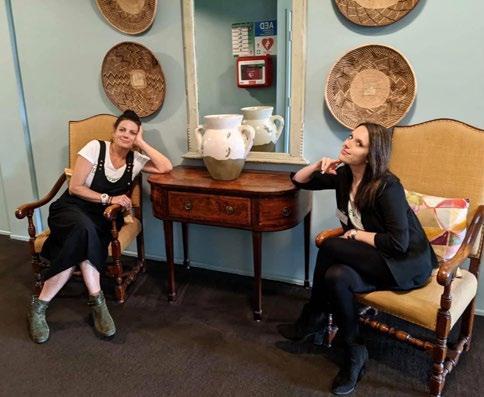
5 minute read
Community Table
The Community Table: Recovery Through Connected Eating
The Community Table (CT) aims to support people who are recovering from eating disorders. The program was developed in response to a service gap that was identified by members of the ED community regarding community-based meal support programs. CT was developed to bridge that gap by providing a structured and supported group program to allow individuals to work towards nutritional goals, engage in social eating and develop skills to manage meal related anxiety and distress.
Advertisement
CT consists of three-hour group sessions, run over five consecutive weeks. The program is underpinned by Carolyn Costin’s ‘Soul Food’ principles of connection, pleasure, creativity and miraculous wonder. These principles foster a supportive meal environment and help our clients feel connected and safe. Alongside specific meal-support, the program offers opportunities for clients to develop new strategies for managing meal related and other distress. This is achieved through a range of sensory and mindfulness-based activities including craft, gardening, interactive games and cooking. Eating Disorder Practitioners Amber Dwinell and Lucy Galbraith alternated in co-facilitating five rounds of the program across the year in partnership with facilitators from Queensland Eating Disorder Service (QuEDS). Peer worker, Laura also helped to facilitate one round.
A review of the quantitative feedback over the last year reflected the success of the program. Several clients stated that they enjoyed the meals and asked for recipes so they could cook the meals at home. One client expressed they had never experienced the joy of cooking until this group. Across all groups, clients identified that connection was an important component of the group.
“The meal activities helped keep my mind off the food and they were really enjoyable. The clay was one of my favourites as I was able to make something meaningful to me as a loving reminder/guide to recovery”
- Participant 2021.
The Community Table program will continue through the remainder of 2021 and into 2022, with continuing evaluation to ensure that the program is reflective of meeting client need.


PEER SUPPORT WORK
Peer Support Worker Role
The Peer Support Worker role provides a non-therapeutic, practical adjunct to those accessing individual therapeutic support. It gives hopes to give clients and the opportunity to practice the skills learnt in therapy in a safe and supportive space. Importantly, peer support workers assist clients normalise the experience of having an eating disorder which can greatly contribute to their overall recovery goals.
During the last financial year 2020-21, there has been strong and growing interest in clients wanting to access peer support work. Clients are offered five sessions which can take place either face-to-face or via telehealth.
Through a client-led and strengths focused approach, Peer Support Workers Laura and Mandy share their personal lived experiences, can answer questions, and offer practical suggestions while enabling them to make a strong connection with those who are going through similar experiences.
The goal of an Intentional Peer Support is to encourage, inspire and educate their clients. They assist in building confidence and resilience, inspiring them with examples from their life and showing them that their personal challenges can be overcome. This personal connection can help to break down a client’s barriers and is an essential component in building trust. This trusted relationship is often a challenge to achieve but is an important aspect of encouraging a client’s recovery.


Client Feedback
“Thank you so much for taking the time to talk things through with me today, I really appreciate your time, kindness and wisdom. It’s so lovely having you, I honestly feel like I have known you for years!’’
“Thank you so much for your support today, it means a lot to me. I just wanted to send through a bit of the art, as our sessions have shown me that sharing thoughts, experiences and creativity is a truly wonderful opportunity and one I have come to really value.”
MEDICARE AND NDIS
HOSPITAL AND HEALTH SERVICE REFERRALS
The Medicare and NDIS streams of our service have continued to be a popular option for individual counselling clients. Clients with a Mental Health Care Plan, Eating Disorder Care Plan (introduced November 2019) and Enhanced Primary Care Plan can access Medicare-subsidised individual counselling or dietetic sessions. Clients with NDIS funding for Capacity Building – Choice and Control or Daily Living can access Recovery Coaching, Therapeutic, or Dietetic Sessions.






Rosie
Clinical Psychologist
Jane
Social Worker
Megan
Dietitian
Lisa
Dietitian
Following from the establishment of the COVID-19 stream during 2020, EDQ has continued to provide support and services to clients being referred from Hospital and Health Services (HHS) and Queensland Eating Disorder Service (QuEDS). This program is aimed to provide fast tracked support to those individuals living with an eating disorder who are acutely impacted, lacking supports, and at increased risk of hospitalisation.
Through the collaboration with HHS and QuEDS, referrals have been steadily increasing for EDQ therapeutic counselling, dietetic and peer support services. Both Senior Practitioner Christophe and Care Navigator Rohie receive these referrals which are assessed for suitability, then allocated to the EDQ clinical team to assist with fast tracked intakes and individual services.
This model of care has interested other HHS providers and additional discussions have been undertaken with the aim of widening the range of HHS referrals to include North Queensland Eating Disorder Service, and other Metro Hospital Services.
This pathway was established through ongoing additional from Qld Health to further support the impacts of the COVID-19 pandemic.









